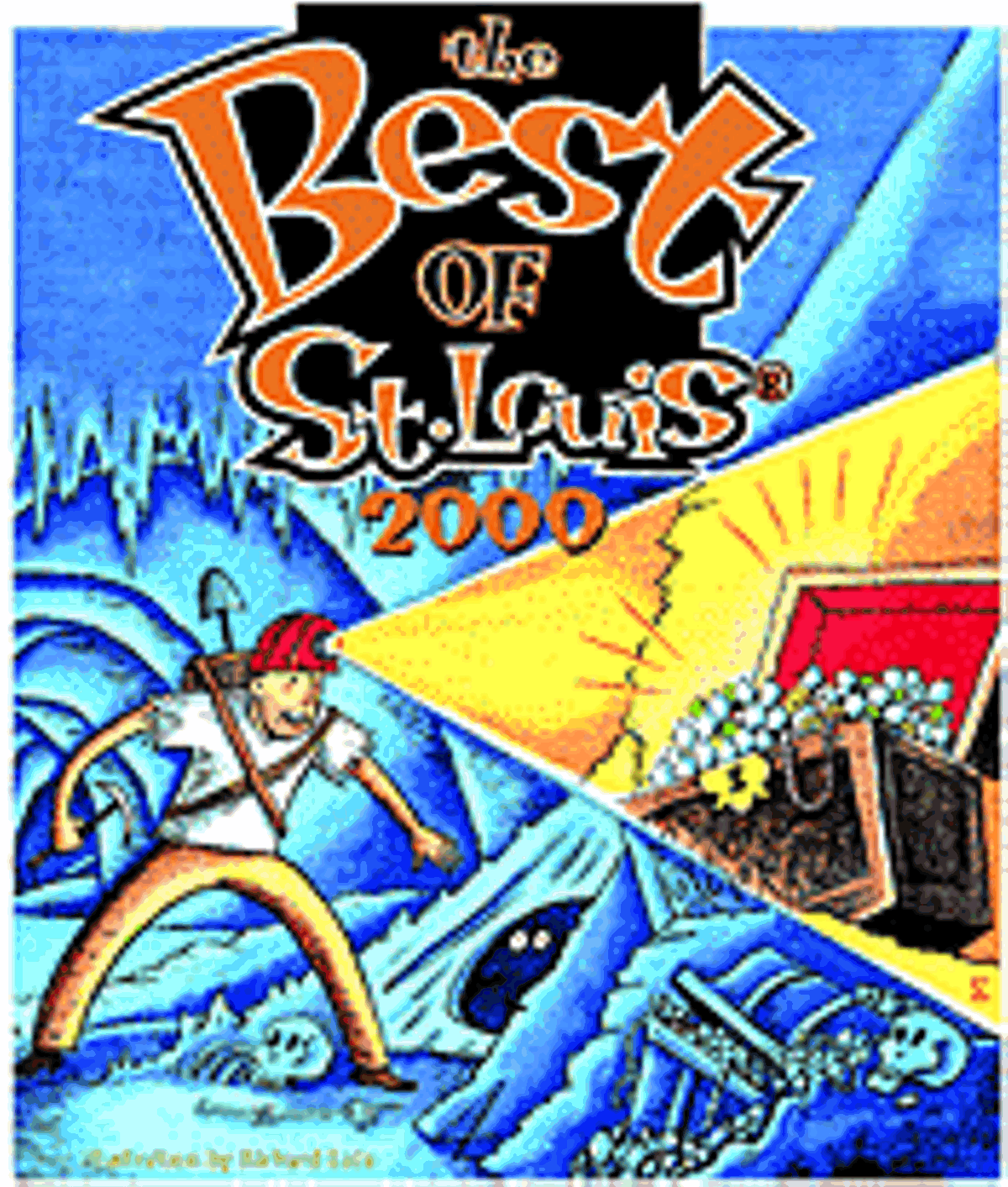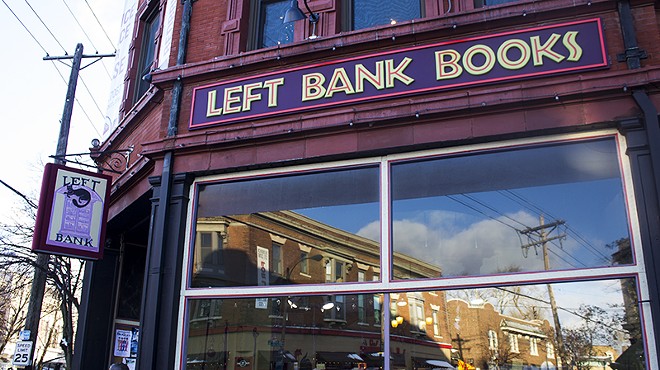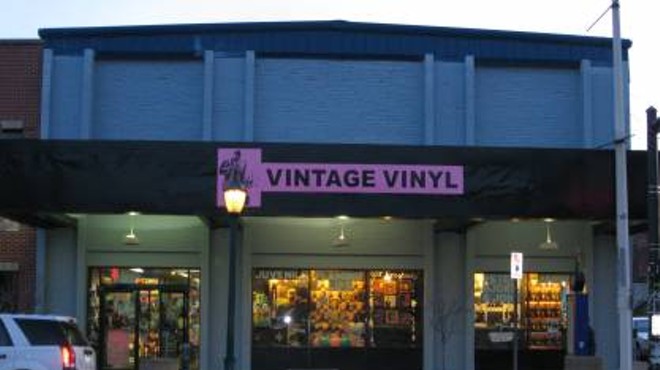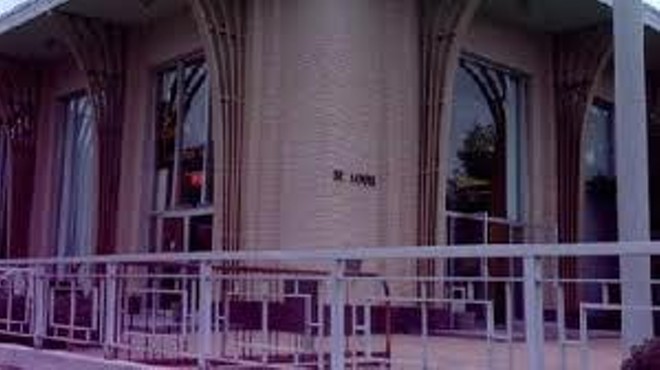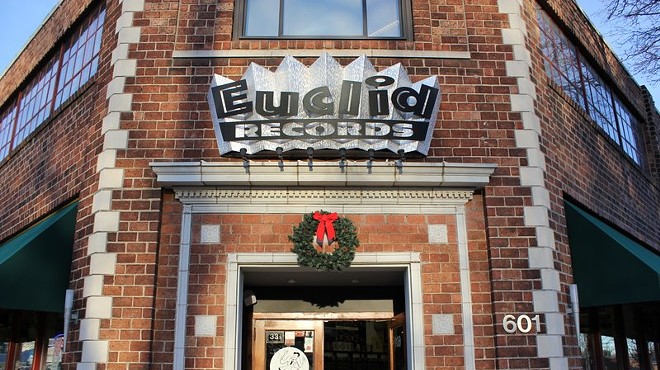Let's do this one by negative example. Not long ago, we were in one of the large chain stores in the area, looking for a book to read on vacation. The choice -- Stefan Kanfer's Groucho: The Life and Times of Julius Henry Marx. We approached the information desk and asked whether there was a biography section in the store. The clerk said there wasn't, but what were we looking for? "That new biography of Groucho Marx," we said. Long pause. "So, is he a historical figure?" the clerk stammered. Before we could snap out of our state of shock and reply that, no, he was a hysterical figure, the thought occurred: "Should have gone to Left Bank." It's a mistake we won't make twice. Besides having a fine, knowledgeable staff (which, we're betting, knows Duck Soup from Chicken Soup for the Soul), Left Bank Books is the last of the great independent local bookstores, which means shopping there is as much a statement as it is a pleasurable experience. The fact that they've survived in the era of superstores and dotcoms says that Left Bank offers something special -- something tangible in terms of having the book you want at a price you can afford, sure, but also something less tangible and less common these days -- they know their customers, and their customers know them. Isn't that how it's supposed to be?
-
Left Bank Books
399 N Euclid Ave, St. Louis
St. Louis - Central West End
314-367-6731
46
articles
If the Book House didn't have a sign in front of it, it would just look like an interesting, large old house. And when you step inside, you see that it still basically is an interesting, large old house. None of the walls, interior or exterior, appears to have been removed or moved, yet this place is no longer a residence but a three-story used-book store, with every available inch of space covered by bookshelves and books. The Book House is everything a bookstore should be, with winding staircase, readily attainable solitude in the stacks and the occasional cat. And books. There's a swell selection of forgotten, amusing and cheap used books, but, again, the kicker is the building itself. The 1865 manse is all creaky staircases, narrow passages and rooms both tiny and big lovingly plugged up with books. To enter the poetry section, you have to bend down and get inside a roof dormer! The "Bargain Basement" is a cool cellar lined with books that are $10 a bag, a bulk-buying bookworm's delight. I'm sure that more than a few bibliophiles have spent their first visit here thinking in amazement that this is their home fantasy library come to life. "Why can't I make my house look like this?" they think. ("Because my spouse would divorce me," the inner voice replies.) During the winter holidays, the Book House hosts a party that takes their inexpensive prices down a notch further and offers cookies and punch to all comers. Sure, you'll find what you want at Barnes & Noble or Borders, but the prefab environments there are a mockery of the old, romantic character that is the Book House. There is no substitute.
-
The Book House
7352 Manchester Rd, Maplewood
Maplewood
314-968-4491
4
articles
The Clayton Borders, formerly Library Ltd., offers a huge selection of children's titles, from educational books on dinosaurs, the human skeleton and Japanese for Children to Dr. Seuss, Stuart Little and 20,000 Leagues Under the Sea. The real draw is the giant storybook castle that surrounds the children's area, with a series of funhouse mirrors housed inside a turret. There are other entertaining diversions, such as a wooden train set and a easel with sticky felt characters, as well as miniature tables and chairs that encourage kids to sit down and stay a while. The music selection is extensive, with tapes and CDs featuring everything from Mozart for babies to Schoolhouse Rock. Too bad this location, on a prime spot of Clayton real estate, is slated to close in September 2001 as Borders moves to the Brentwood Town Center, across the street from the Brentwood Promenade. For fans of the castle, more bad news: Although the design of the new store is still in the works, the castle probably won't be part of it.
Now, your comic-store regulars come in three kinds: the superhero and barely-clad-female connoisseur; the customer who prefers an "alternative" (don't you hate that word?) to the aforementioned well-trod paths; and the patron of the arts with the wisdom to recognize the value of both aisles of the beloved comics emporium. Admittedly, the Fantasy Shop chain does seem to lean more toward the superhero fan than the alternative reader, but that's cool, because the writing of nearly all comics is so crappy that, from that standpoint, there really isn't much alternative anyway. After Watchmen, what else is there? OK, fine, Maus, The Dark Knight Returns, Eightball, Frank -- they're all real good, but Darkchylde and Impulse and Cry for Dawn? Come on! There's a world of shitty comics out there that thoroughly obfuscates the rare treasures. Submitted for your highly subjective approval, here are the two big reasons the Fantasy Shop chain must claim the mantle as the best comic-book store(s) around: (1) Convenience. There are Fantasy Shops in Maplewood, Kirkwood, Hazelwood, Affton, St. Charles and Fairview Heights, Ill. So when you're out on the weekend tooling around, there's a fair chance you'll be near one. They're doing their part to spread the glory of comics to the masses and to absorb the extra hormonal energy of youth that might otherwise be used for evil. (2) The Big Back-Issue Extravaganza: If there is a God, then it must be she who brings a little piece of heaven to earth when the St. Chuck Fantasy Shop megalocation sells off literally tons of comics for 25 cents per -- yes, we're not kidding, 25 cents per comic -- for all kinds of new and old goodies annually. This feeding frenzy of fanboys is spread out over several days, and there is so damn much bargain goin' on that shoppers have been known to pass out from pleasure and/or drop their life savings on old issues of Green Arrow. Righteous.
Among the reasons comics get so little respect are their ephemeral packaging and serial publication. Although few comics are printed on the cheap newsprint of old -- which quickly yellows and crumbles -- even when slicked up by glossy paper and card-stock covers with holograms and die-cuts and spot varnishes, comic books, despite their misleading name, aren't really books: They're magazines, and usually small ones at that, and those who don't fetishize and obsessively collect such periodicals tend to toss 'em like last week's People or Newsweek. Worse, most comic-book stories are told over the course of many (sometimes very many) issues, and unless you faithfully make a weekly visit to the comic shop, chances are you'll miss an issue, resulting in an unpluggable plot hole. Fortunately, during the last 15 years or so, publishers have begun collecting extended narratives into trade paperbacks and even hardcovers, making easily accessible what once required absurd diligence. Of course, the other reason comics get so little respect is their juvenile content, and no amount of gussied-up packaging can disguise the puerile nature of most superhero "story arcs." But stroll into Star Clipper Comics & Games and you'll find dozens, even hundreds, of volumes on its walls, and most are not just adolescent power fantasies. Try Joe Sacco's Safe Area Gorazde, his harrowing journalistic account of the Bosnian war. Or Tony Millionaire's darkly antic Maakies. Or Chris Ware's gorgeously designed Jimmy Corrigan: The Smartest Kid on Earth with its eye-popping unfolding dust jacket. Or Alan Moore and Eddie Campbell's From Hell or Daniel Clowes' David Boring or Seth's It's a Good Life If You Don't Weaken or ... well, you get the picture. Now go get the words and pictures.
-
Star Clipper
1319 Washington Ave, St. Louis
St. Louis - Washington Avenue
314-240-5337
29
articles
There have never been as many options for buying music as there are today. You can buy it at Wal-Mart, on the Web -- heck, if you don't mind limiting yourself to the Britneys and 'N Syncs of the world, you can buy music at McDonald's these days. But chances are, if you really love music, you wanna go where there are other people who do, too. In terms of St. Louis record stores, that means Vintage Vinyl. Some of the large chain stores might be able to outdistance Vintage in the size of their stock, but no other store can match it for its vibe -- the live DJ, the knowledgeable (and opinionated) staff, and, not unimportant, a customer base that keeps them on their toes. People who know music count on Vintage to have something in stock that will intrigue them, and the Delmar institution seldom, if ever, disappoints.
-
Vintage Vinyl
6610 Delmar Blvd., University City
Delmar/ The Loop
314-721-4096
22
articles
Record-store clerks behave like members of an exclusive club -- one in which inclusion is guaranteed to those for whom "customer service" means "funeral for a shopper." Record-store clerks start as uncorrupted rock fans with musical notes in their eyes. Before long, though, a cancerous cynicism grows inside, usurping the sanguine innocence. It's like Buddy Holly doing a Dorian Gray descent into Sid Vicious. Record-store employees have seen and heard it all. They no longer wish to face the music -- it's become the dissonance of too many questions, too many people's ignorance of the very music they seek (an aggravating paradox) and too many times giving directions to people who don't reveal their starting point. They make fun of customers. They take lunches longer than Woodstock. And those are the
nice clerks. Customer service has been retired with the turntable, and most employee talk is off-the-record.
At Wherehouse Music in South County, Jim Lovins not only faces the music, he shakes its hand. With his announcer-bordering-on-carnival-barker voice and self-charging energy, Lovins is proof that youth is wasted on the young. He evokes one of his idols -- perhaps Henry Mancini or Duke Ellington addressing his orchestra -- when he offers, "You're only as good as the people around you." He points out that he trained the staff, not so much to take credit as to explain the jarring friendliness.
With his cheery paunch and doughnut of hair, Lovins is not your -- well, actually he is -- your father's record-store clerk. In a samplified atmosphere of dance, rock and pop, where some employees are younger than disco, Lovins, 61, sticks out like a trumpet solo. But he unites the disparate worlds of music and courtesy, which he happens to think go together better than rhythm & blues, a style Lovins knows plenty about, along with jazz, classical and soundtracks. He drops little nuggets: That Quincy Jones credits Mancini with bringing jazz to TV on Peter Gunn. That John Barry didn't write the James Bond theme; it was only his arrangement (this is still up for debate, although Monty Norman is credited). Those facts he gathered on his own, but Lovins keeps an open ear. "I learn from the customer," he says without a drop of condescension. "You might say something now that I never knew, and I'll retain it." He takes mental notes, he says, keeping an ear open for tips on music he hasn't heard. His passion has jazzed up the inventory. "We try to get stuff here that you won't find anywhere else," he says.
Lovins' newest career (he spent years in the grocery business; are peach crates the common thread?) began at the ill-fated Blockbuster Music -- same building -- when word got out that a classical expert was needed. Back then, used CDs weren't something you could find in many of the big chains. In fact, he admits, "There are still people who won't buy used. They don't want it; they want new. I like used CDs, because I can buy more."
Lovins buys new music to complement his vintage favorites. He gestures over to a wall. "I like Kiss. We won that Kiss plaque. I won it," he humbly clarifies. "We all competed against each other. I happened to sell one or two more. I guess I was just lucky." Gene Simmons and Jim Lovins aren't that different. One paints his face; the other draws customers.
-- Jordan Oakes
Record collecting started out as a hobby for Jean Haffner and ended up as a career. The owner of the Record Exchange grew up in the Texas Panhandle town of Canyon, where his next-door neighbor was Buddy Knox, the rockabilly artist who recorded the hit single "Party Doll." Haffner never got over the infatuation with rock & roll that he acquired as a teenager. His record collecting became a full-time occupation for him 25 years ago. His store, which is now located in a huge former public-library building at the corner of Eichelberger and Hampton, deals exclusively in used records in every conceivable format: cassettes, LPs, CDs, even eight-track tapes. He says he offers one of the largest inventories in the country, with the used CDs a particular bargain. Haffner says he decided to devote his whole life to his musical interests after the death of Elvis Presley in 1977. So the giant used-record store in South St. Louis is sort of a tribute to the King.
-
The Record Exchange
5320 Hampton Ave., St. Louis
St. Louis - St. Louis Hills
314-832-2249
11
articles
It seems at this point pointless to declare oneself in the matter of analog vs. digital culture. Compact discs, whose sole salutary aspect is their compactness, provide an efficient, durable information-delivery system. But as recording media go, they're about as cool as dictation cassettes. Long-playing record albums, on the other hand, are pretty boss. In the basement of Euclid Records Vinyl Shack is the Jazz Hole, in which are records, a lot of records. In fact, the place is that rarest of spaces: a site of commerce so suffused with the goodness of its product that capital flows overhead without disturbing the vibe below. And what grooves. For all the Leonard Feather Presents ... and Jazz Goes to University, there are, within reach, records of a revolutionary character. A recent visit turned up a promo copy of the Arista Freedom Sampler, containing radio-friendly (sure) cuts from Charles Tolliver and Marion Brown; some Nat Hentoff-produced Cecil Taylor sessions; scads of Base Record reissues of ESP-Disk sides and a few Get Back editions of same; and an inexplicable three copies of the second volume of Sam Rivers' Wildflower compilations. Or you could just download your music. How cool.
-
Euclid Records
601 E. Lockwood Ave., Webster Groves
Webster Groves
314-961-8978
11
articles
Out in the wastelands of suburbia, where it's hard to distinguish the latest big-box retail development from the newest church, you can go to places they call music stores. Young clerks with pierced body parts are waiting there to serve you. Everything is on sale -- or will soon be. There are closeouts, limited-time offers, special service deals and a general aura of consumer hysteria. When you do make a purchase, it's a pact for life. They will take your name and number and soon thereafter you will be sent an endless stream of invitations and catalogs. If all this hype makes you vaguely depressed and anxious, there is an alternative. Huelsing Music has been supplying musicians with the tools of their trade since 1976. That's when jazz guitarist Paul Huelsing bought the store, which the original owner opened in the mid-1950s. Besides a large selection of guitars and other stringed instruments, Huesling offers a full range of accessories. The stores backs its sales with service and offers lessons to fledgling guitarists. Mainly, though, it's an asylum from mass-marketing madness. Check it out, buy a set of strings and browse in peace.

